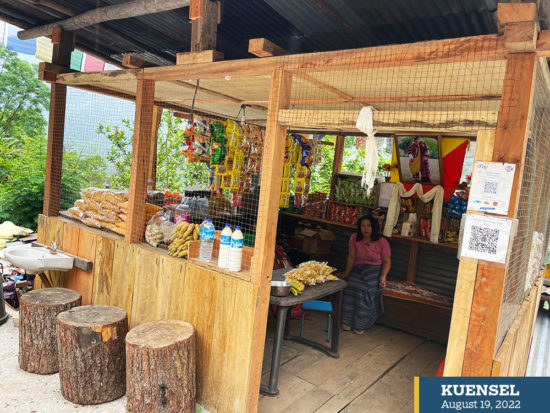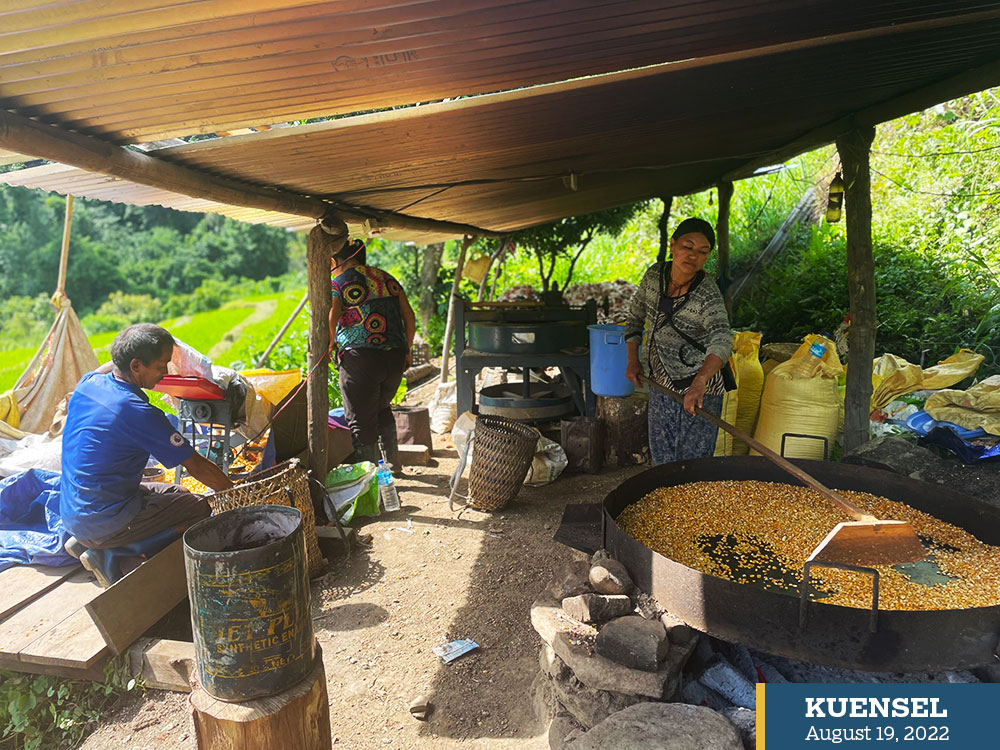Tshering Namgyal | Saling
If one travels along the stretch between Menchugang and Yongkola on the Lingmethang-Bumthang highway, one can enjoy a tantalising aroma of fresh tengma.
Most often it succeeds in compelling travellers to halt for a moment to pick up some of this natural and healthy diet on sale. The tengma-making machines dot the highway at various locations.
The decade-old business has always been a successful source of income for Saling farmers in the locality. It has encouraged farmers to increase production over the years. They sell in their small temporary market sheds along the east-west national highway.
A few years ago, only a handful of farmers were engaged in tengma business. Today, all of the 80 households in Thrindangbi village and some from Jangdung village under Saling gewog are into this business.
Today, most farmers (more than 50 households) own individual machines to flatten the maize at home and only a few depend on neighbours.

Tengma on display in the market shed along the Mongar-Bumthang highway
Each household sells at least 500kg of tengma in a year earning more than Nu 100,000. A 1-kg packet costs between Nu 150 and Nu 200.
Residents said they don’t even keep any maize to produce kharang (ground maize) for self-consumption. They buy rice after selling tengma.
“We don’t sell kharang because it can fetch only about Nu 50 a kg,” said one of the farmers, Tshewang Dorji. “Selling tengma makes more income than kharang.”
To preserve the natural taste, the farmers first fry the maize lightly. It’s then put into the corn sheller machine to remove the grains from the cob. The grains are fried again and flattened in another machine and packaged.
“It tastes better, sells better that way. So most of us do that,” another villager Tshering Wangmo said. She sells more than 1,000kg of tengma a year.
Farmers who have dry land in the low-lying areas cultivate maize as many as three times a year while those in the higher regions do seasonal business.
Customers are both travellers who take it for personal consumption or as gifts, while others buy it to sell.
One of the earliest roadside vendors in Thrindangbi, Pema Thinley, who sells up to 3,000kg of tengma in a year charges as high as Nu 300 a kilogram. The price drops gradually to Nu 150 when those in neighbouring areas harvest their maize.
He said he sells tengma almost round the year including off-seasons after buying dry maize grains from Tsamang, and Kengkhar in Mongar, and Lhuentse. He said the business has helped him raise his seven children and educate them.
There are few others like him who do tengma businesses on a large commercial scale.
Pema Thinley said usually those who have manpower shortages at home prefer to send the maize to customers in Thimphu and Phuentsholing in large quantities while others sell from the sales counter along the highway.
Of late, more farmers are seen coming up with new sheds after they were allowed to construct market sheds and operate businesses by the roadside following the change in road guidelines earlier this year.
Sangay Zangmo recently started the tengma business and sells tengma and other vegetables at the government-built market shed at Menchugang. She said there is good demand for tengma.
“Our tengma is known for taste and we want to maintain it to attract more customers in the future,” she said.
Farmers of Chali gewog also sell tengma but on a smaller scale at the Mongar vegetable market and the Gangola junction on the Mongar-Thimphu highway.


